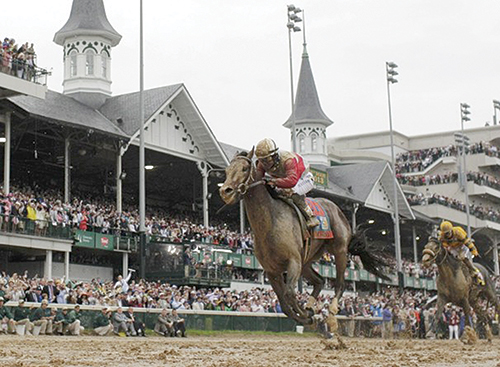The Kentucky Derby kicks off a five-week stretch of elation and enervation for everyone who loves horse racing. Ownership dynasties spend generations longing to see one of their stable’s steeds garlanded in roses in the winner’s circle.
Kentucky Derby

The Kentucky Derby kicks off a five-week stretch of elation and enervation for everyone who loves horse racing. Ownership dynasties spend generations longing to see one of their stable’s steeds garlanded in roses in the winner’s circle. Thousands of trainers around the country wake up early day after day, year after year, dreaming of the moment they can finally watch a horse they’ve nurtured cross the line ahead of the field. Then there are the jockeys, who have spent decades breaking their bodies down on bone-jarring rides around small tracks in an unforgiving winnowing of the worthy from the wannabes.
Everyone arrives at Churchill Downs in Louisville cautiously optimistic that this might be the time when their efforts are finally rewarded. And they are also well aware that all the skill in the world must wed itself with luck on that most hallowed day of the year at the track.
Tens of thousands of fans attended the race in person on Saturday, and millions more tuned in to the televised broadcast. For those multitudes, many of whom plunked down a few bucks in the hope that it might be converted into much, much more, the same principle holds true—for all the skill of the seasoned bettor, raw luck ultimately dictates who walks away with cash-stuffed pockets.
I made the trip out to Portland Meadows to celebrate Derby Day with 15 of my friends, mingling with the crowd gathered for an afternoon of mint juleps and thoroughly imprudent wagers. As we basked in the sunshine and cigar smoke curled around the flamboyant hats of the more audacious ladies in attendance, everyone sifted through the daily racing form and consulted their notes. Nearly all of them were confident that they had the winner among the thousands of tickets being printed out of machines throughout the grounds.
My buddy Bob had been texting back and forth with his brothers in Illinois, debating combinations of horses for exacta and trifecta picks. Finally they decided on three thoroughbreds—Revolutionary, Verrazano and Orb. The horses were set to race out of gates three, 14 and 16 in the official program.
But when Bob received the text message with the final selection, a “1” had gotten lost in translation. Walking up to a betting machine and inserting a tenner and two singles, Bob pushed the three and the 16 for Revolutionary and Orb—and four, picking 36-1 long shot Golden Soul instead of Verrazano.
Lady Luck planted a big wet kiss on the three brothers as the 19-horse field took to the sloppy track for the most exciting two minutes in sports. The starting pistol fired, the horses bolted out and
Verrazano faded quickly from the pack for a 14th-place finish. Orb and Revolutionary got a shaky start but quickly moved up through the field —the morning favorites showing their propensity for late charges—and came in first and third, respectively.
And then there was Golden Soul. As the lightly regarded great-grandson of 1973 Triple Crown winner Secretariat fended off Revolutionary and three-time Derby-winning jockey Calvin Borel, hundreds of people around Portland Meadows immediately started tearing up their tickets and tossing the losing confetti into the air.
Shug McGaughey, the Hall of Fame trainer in charge of Orb, finally claimed a Kentucky Derby victory after three decades of waiting for the right horse. It was also validation for the hot start to the season by Orb’s jockey, Joel Rosario, with the Dominican native claiming his first-ever Triple Crown race just five weeks after taking the $10 million Dubai World Cup.
After the bedlam died down, I looked over at the most serious gamblers in our group. One, Asa, had put down $120 on one of his bets, hoping to turn it into $50,000 by picking the first five finishers for the elusive superfecta. He had spent days engrossed in bloodlines, race results, jockey records and trainer histories, mulling over his picks up until the final moments before post time in Kentucky. Now he stood in front of the screen staring straight ahead in a daze, clutching a ticket on which four of the five numbers matched—foiled by the long shot that had placed.
Then I turned to look at Bob. He was thumbing feverishly through a stack of slips, trying to locate the mistake that had made him a winner that day. Eventually he found it and strode up to the window to cash in on Golden Soul’s unlikely run. Bob collected a $7,000 bundle for his blunder, stuffed it into his pocket and raced out to his car as quickly as he could before the gods realized what he had gotten away with.





